Wednesday, August 20, 2025. Annette’s Roundup for Democracy.
The battle of the mail-in ballots.
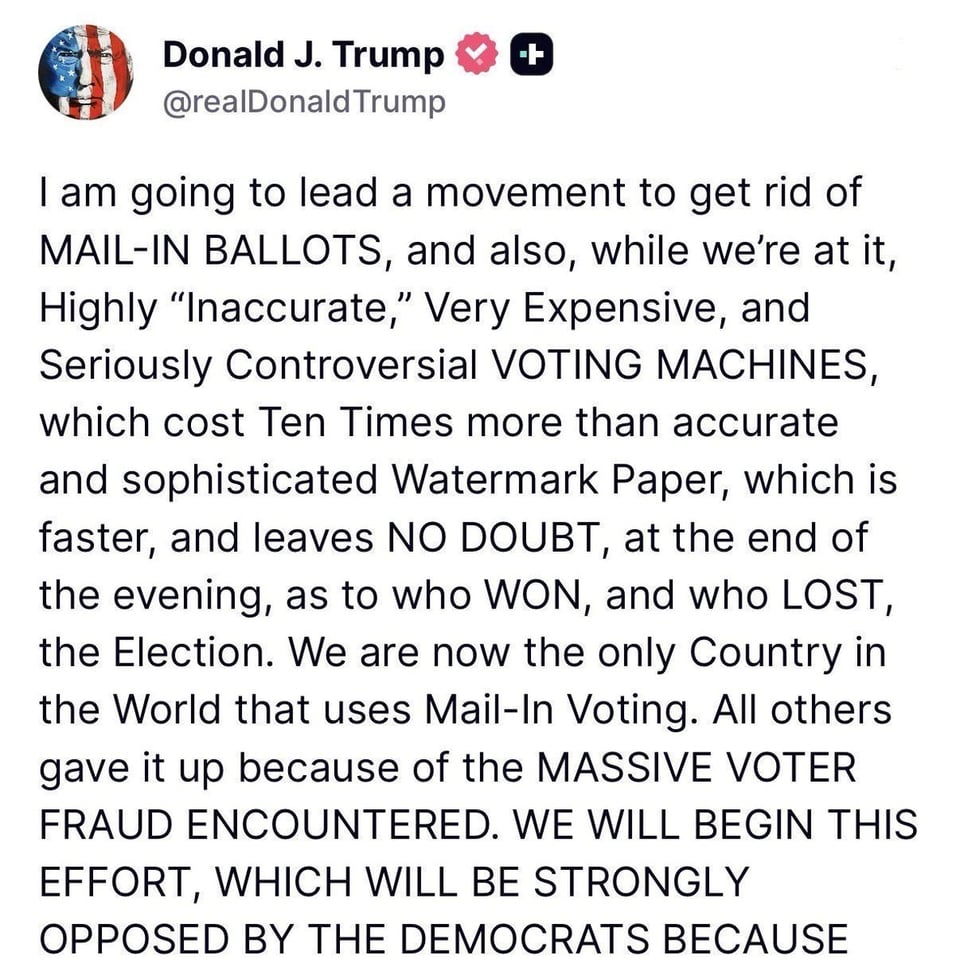
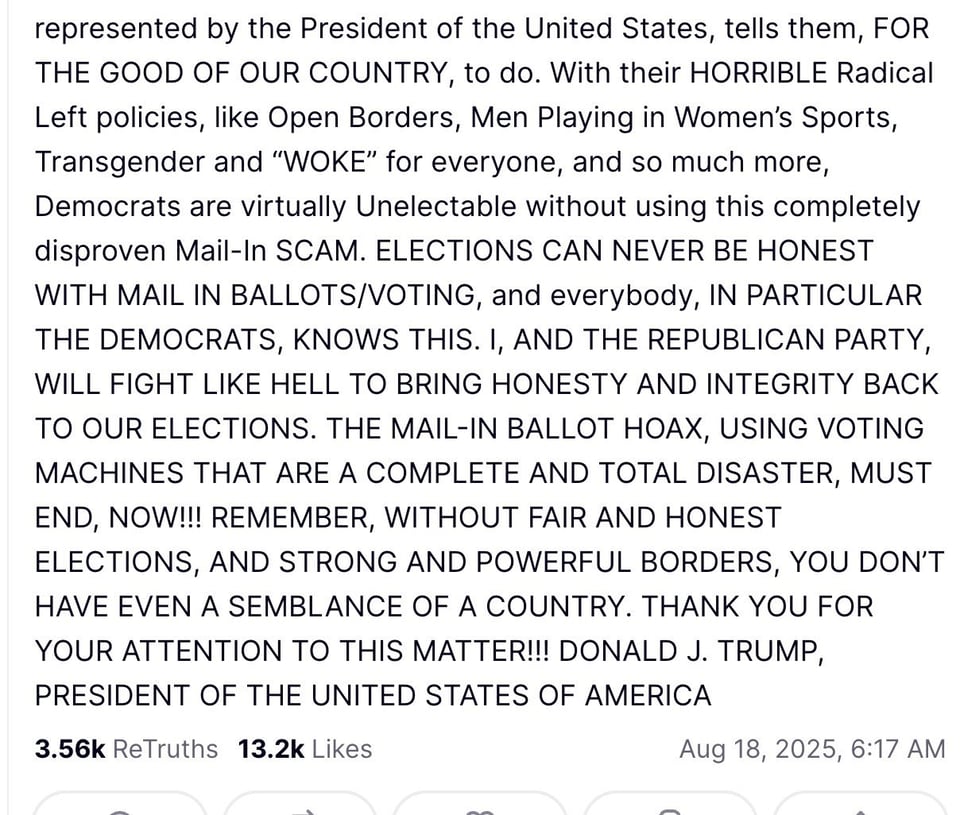
We will win this. The Constitution tells us so. 👇
President Trump can sign whatever executive order he wants to sign — but it won't change the Constitution.
— Governor Josh Shapiro (@GovernorShapiro) August 19, 2025
And according to our Constitution, the authority to set our election rules belongs to the states.
We will protect mail in ballots in Pennsylvania. pic.twitter.com/yUvsNXuXDz
So do the people. 👇
Voters think Trump's full of BS when it comes to voting by mail & his 2020 election garbage.
— (((Harry Enten))) (@ForecasterEnten) August 19, 2025
-60% say no excuse absentee/early voting should be legal
-63% say the 2020 election was legit
-Majorities for both 2020 (59%) & 2024 (75%) say mail votes were counted correctly pic.twitter.com/9fnEnnJD4R
Mail-in voting fraud is rare, with studies showing rates of 0.0003% to 0.0025%. Call and write your elected officials. Democracy depends on us.
While Trump focuses on Ukraine and Russia in order to win the Nobel Prize, don’t be fooled. His dangerous authoritarian behaviors continue.
Attacks on the Smithsonian.
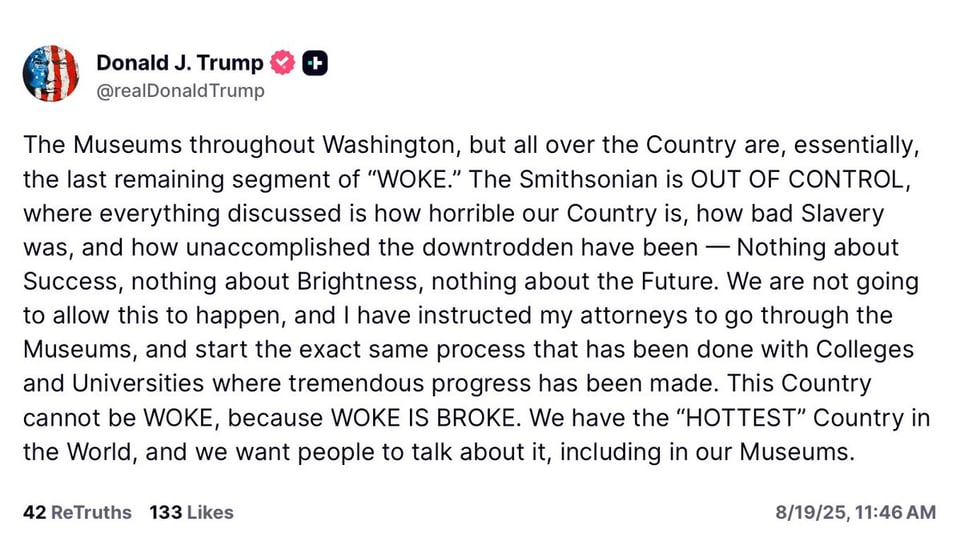
Shocking Demands from our universities.
Trump Wants Universities to Show Him the Money, or No Deal.
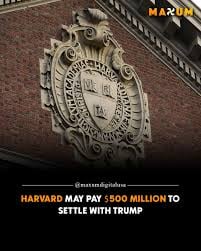
President Trump has personally stipulated that hefty financial penalties be part of agreements his administration is negotiating with the elite universities. Critics call it extortion.
In May, cabinet officials and West Wing aides brought President Trump a potential settlement with Columbia University. But instead of giving his sign-off, he issued a new demand.
The school needed to pay $200 million, Mr. Trump told his team. The university’s cost for a deal soared from zero dollars to nine figures in the course of a single meeting.
The sudden stipulation, described by six people familiar with the episode and which has not been previously reported, jarred university leaders. They had seen the fierce backlash that followed when major law firms struck deals with the White House and promised to pour resources into seemingly benign causes favored by Mr. Trump. And although negotiations were still unfolding, they had already spent weeks working through policy changes intended to meet the administration’s original dictates around addressing antisemitism on campus.
Still, eager to maintain $1.3 billion in annual federal grant funding, Columbia ultimately agreed to the price.
The people spoke on the condition of anonymity to discuss private talks.
Since the beginning of Mr. Trump’s second term, his administration targeted elite schools with a few defined goals: root out antisemitism, restore a more traditional definition of gender in campus activities and athletic programs, and expunge perceived liberal bias from colleges.
To achieve those ends, the government unleashed the full scope and breadth of its power. Federal agencies under Mr. Trump’s control have spent months squeezing elite public and private colleges with civil rights investigations, freezing billions in federal research money and threatening to prevent international students from enrolling.
But privately, the president saw dollar signs — and the chance to put his personal stamp on institutions that prize nothing more than their independence.
Critics have likened Mr. Trump’s methods to extortion. The White House has said that the goal of extracting money from universities is to enhance trade schools, apprenticeships and other “real world” training.
Now, a hefty payment appears to be a bedrock provision for any deal, including one with Harvard University, which the administration sees as its biggest prize, and which has billions in federal grants at stake. The emerging agreement with Harvard would see the school spend $500 million, owing to Mr. Trump’s demand that the university spend more than double what Columbia agreed to pay.
How Mr. Trump arrives at his figures for financial penalties is not entirely clear, but he has suggested that challenging his administration as Harvard did raises the stakes. He noted in May that Columbia had taken itself off “the hot seat” by negotiating with the government without availing itself to legal remedies. Harvard sued the administration, leading to many weeks of acrimony before talks restarted.
“Every time they fight, they lose another $250 million,” Mr. Trump said of Harvard in the spring.
“Harvard has to understand, the last thing I want to do is hurt them,” he added. “They’re hurting themselves. They’re fighting.”
Administration officials have also signaled that a university’s wealth is a significant factor in the financial terms that the White House pushes. Still, the government’s demands of the University of California, Los Angeles, this month suggest that other considerations matter, too.
As of last summer, the university had total endowment assets of roughly $10 billion — about $5 billion less than Columbia’s endowment and about $43 billion less than Harvard’s, the nation’s largest.
But in a draft agreement reviewed by The New York Times, the administration asked U.C.L.A. to make payments to two recipients: $1 billion to the federal government and $172 million to a claims fund to compensate victims of civil rights violations.
The White House has not publicly explained the formula for the U.C.L.A. demand.
But over the past six months, the Trump administration’s assault on higher education has moved from the purview of government agencies and the administration’s antisemitism task force to a process mostly controlled by the West Wing.
This shift has sharpened the government’s pressure campaign into an insistent focus on financial promises, an approach that Mr. Trump has deployed elsewhere to impose his agenda, including on trade policy and bringing major law firms to heel.
“The settlements serve as an accountability measure, and the Trump administration commends the universities for collaborating to restore the greatness of these once-revered institutions and uphold students’ rights on campus,” Harrison Fields, a White House spokesman, said in a statement.
But officials from several universities have privately described feeling as if they had little choice but to take Mr. Trump’s demands seriously, no matter how exorbitant they seem, given the government’s leverage in funding medical, national security and other research that schools perform.
Mr. Trump appears to have a limited interest in the finer details of the financial settlements. He has not insisted, for instance, that universities write checks to the Treasury Department — Brown University will spend $50 million on state work force development programs — and there is no evidence that Mr. Trump has sought to direct money to pursuits like his presidential library. But government officials have made clear there is little room to haggle over the price tags.
A person familiar with the talks between the government and one of the universities said administration officials had conveyed that the financial demand was nonnegotiable.
The Trump administration began seeking a financial settlement from Columbia after Harvard sued the government in April.
The litigation stunned the White House, which had expected Harvard to surrender to a list of intrusive demands, and it complicated talks with Columbia as administration officials diverted their attention from Manhattan toward the defiant university in Cambridge, Mass.
Within weeks, though, administration officials were confident enough in the talks with Columbia that they headed to see Mr. Trump. The president surprised aides with his new demand for a financial penalty, and the White House, according to two people familiar with the negotiations, soon told Columbia that $200 million could go either to the government or to trade schools.
School officials have publicly acknowledged that they viewed the restoration of federal funds as vital to maintaining Columbia’s top-tier standing, and the university did not seriously contest the sum. Instead, internal deliberations often focused on where Columbia’s money would be spent.
Ultimately, two people familiar with the negotiations said, Columbia leaders were reluctant to follow the model of the law firm Paul, Weiss, Rifkind, Wharton & Garrison, which drew scorn after it pledged $40 million in pro bono legal work to causes Mr. Trump supported.
Payments to the government would bring fewer administrative headaches than trying to distribute the money to trade schools, according to the people with knowledge of the talks. But, more crucially, a payment to the U.S. Treasury would help the university avoid directly burnishing a Trump project that blended policy with his political brand. (The university, whose final deal included a provision explicitly shielding its academic freedom, also agreed to a $21 million settlement with the Equal Employment Opportunity Commission.)
More recently, Harvard has been negotiating with the White House over the terms of a $500 million settlement. Unlike Columbia, Harvard has sought not to make a direct payment to the government. Though the terms could ultimately shift, the university is poised to spend $500 million on vocational and educational programs.
The demand of U.C.L.A. is the largest that has become public.
James B. Milliken, the University of California’s president, has warned that “a payment of this scale would completely devastate our country’s greatest public university system as well as inflict great harm on our students and all Californians.”
Gov. Gavin Newsom and other state officials were even sharper in their response, condemning the demand as “a billion-dollar political shakedown from the pay-to-play president” and “disgusting political extortion.” Mr. Newsom indicated he would sue.
The administration was unbowed. Asked during a White House press briefing about Mr. Newsom’s lawsuit threat, Karoline Leavitt, the White House press secretary, replied, “Bring it on, Gavin.” (New York Times)
Continued military occupation of Washington while making additional threats to takeover other sanctuary cities.
BREAKING: Progressive Boston Mayor Wu says that she will NOT cooperate with ICE and plans to shield illegals from deportation.
— Gunther Eagleman™ (@GuntherEagleman) August 19, 2025
If you think that @RealTomHoman should SURGE deportation operations in Boston, leave a comment and let him know!
pic.twitter.com/PzP5sGxErt
What’s happening in the White House?

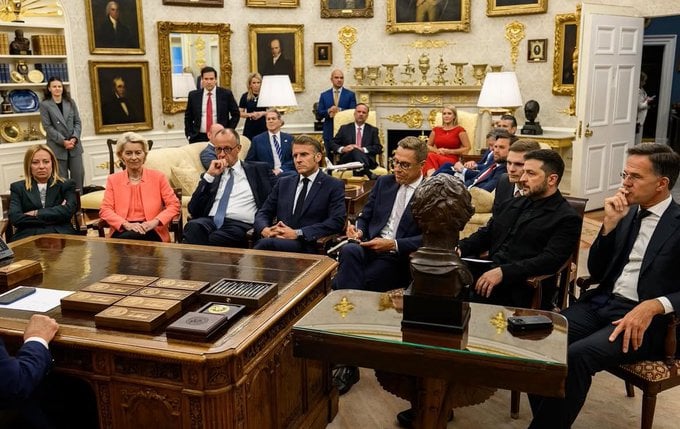
European leaders gathered around President Trump’s desk.
Trump’s Half-Baked Approach to Negotiation
The president hasn’t shown much interest in dealing with the messy details of diplomacy.
On the surface, yesterday’s White House summit on Ukraine showed an impressively unified front among President Donald Trump, major European leaders, and Ukrainian President Volodymyr Zelensky. The participants all smiled and expressed optimism. Zelensky donned a suit, avoiding harangues like those he received over his military attire during his previous visit.
Yes, the leaders offered sometimes exaggerated praise for Trump, but the president also praised each of them in hyperbolic terms, and he had a few good lines, even if NATO Secretary General Mark Rutte laughed a little too hard at some of them.
The biggest division during the meeting was not about whether Trump is more sympathetic to Russia or Ukraine, the central question in the past. Instead, the disunity was over substance versus process. Trump appeared to treat the peace negotiation as basically a series of steps to be completed, while his counterparts were more focused on questions of cease-fires and security guarantees. This cleavage suggests that although European leaders appear to have succeeded—at least for now—in persuading Trump to move somewhat toward them and away from Russian President Vladimir Putin, turning that into a real peace will still be challenging.
For Trump, the answer to stopping the war appears to be getting the right sequence of meetings: First, he met with Putin; then he met with Zelensky; next, he will meet with both men and, he says, hammer out a deal. “We’re going to try and work out a [trilateral meeting] after that and see if we can get it finished, put this to sleep,” he said yesterday. (Zelensky was open to such a meeting yesterday. The White House said today that Putin has agreed as well, but the Kremlin has been publicly noncommittal.)
Zelensky and the other Europeans, meanwhile, were much more concerned about the details of what might come up at this eventual trilateral meeting, or along the way. For the pro-Ukraine bloc, the big victory from yesterday was a discussion of security guarantees for Ukraine—basically, assurances that once a peace deal is in place, allies will assist Ukraine if Russia restarts hostilities. Ursula von der Leyen, the president of the European Commission, discussed creating something similar to NATO’s Article 5 mutual-defense agreement. But Trump was notably vague about what sort of commitments he might make.
Trump also wavered on the importance of a cease-fire. Prior to his summit with Putin in Alaska last week, Trump had insisted on a cessation of hostilities, which Putin flatly rejected. Now Trump seems to have given up on that. “All of us would obviously prefer an immediate cease-fire while we work on a lasting peace,” he said. “And maybe something like that could happen. As of this moment, it’s not happening.” (As if to underscore the point, Russian drones struck Ukraine yesterday—though this sort of provocation also seems to be one reason for Trump’s new openness to Ukraine.)
Some observers were appalled by Trump’s meeting with Putin on American soil, noting that the Russian president is a butcher, an autocrat, and a war criminal wanted on international warrants. All of this is true, and nauseating, but as National Review’s Rich Lowry notes, achieving peace will require dealing with Putin. (When President Barack Obama tried diplomacy with Iran, Republicans were outraged; now the roles are reversed.) Peace deals are judged on results, not always the character of those making them. Yasser Arafat and Henry Kissinger were Nobel Peace laureates, after all.
Sitting down, however, is not enough on its own, and if treated that way, it can simply encourage bad actors such as Putin by giving them status and recognition without requiring any or many concessions. Trump sees himself as a dealmaker, and he’s often described—sometimes, though not always, positively—as transactional. But he is so personally motivated by deals per se that he doesn’t always appear to grasp that others are not, or why they’re not. Trump’s approach to this negotiation has ignored the fact that Putin doesn’t seem interested in a deal at all: He appears content to drag the war out as long as possible. Nor does Trump’s method account for the fact that some terms of a peace deal would be so onerous as to make it unacceptable to Zelensky on patriotic and political grounds. Dealing with the messy details is hard work, and Trump has never shown much interest in, or patience for, policy minutiae. (The Atlantic).
Truth or Dare?
Today’s News
Russian President Vladimir Putin promised to meet with Ukrainian President Volodymyr Zelensky in the coming weeks, according to White House Press Secretary Karoline Leavitt.(The Atlantic too).
President Trump said Tuesday that American troops won't be sent to Ukrainian border as part of a peace agreement with Russia. He said he would provide only air defense, no boots on the ground.
A new reason why Cuomo mustn’t be New York’s mayor.
Yes, he sexually harassed too many women to count. Yes, he demanded COVID-positive patients be admitted to nursing homes, underreported Covid deaths, and edited official reports to protect his own political standing and reshape the narrative around NY’s pandemic response.
But this may be the lowest he has sunk.👇
At (another) Hampton’s fundraiser with Republican donors on Saturday, Andrew Cuomo said it plainly: he’s expecting Trump’s help to defeat us in November.
— Zohran Kwame Mamdani (@ZohranKMamdani) August 19, 2025
“I feel good about that,” Cuomo said.
New Yorkers won’t. pic.twitter.com/qXPL4y6g2h